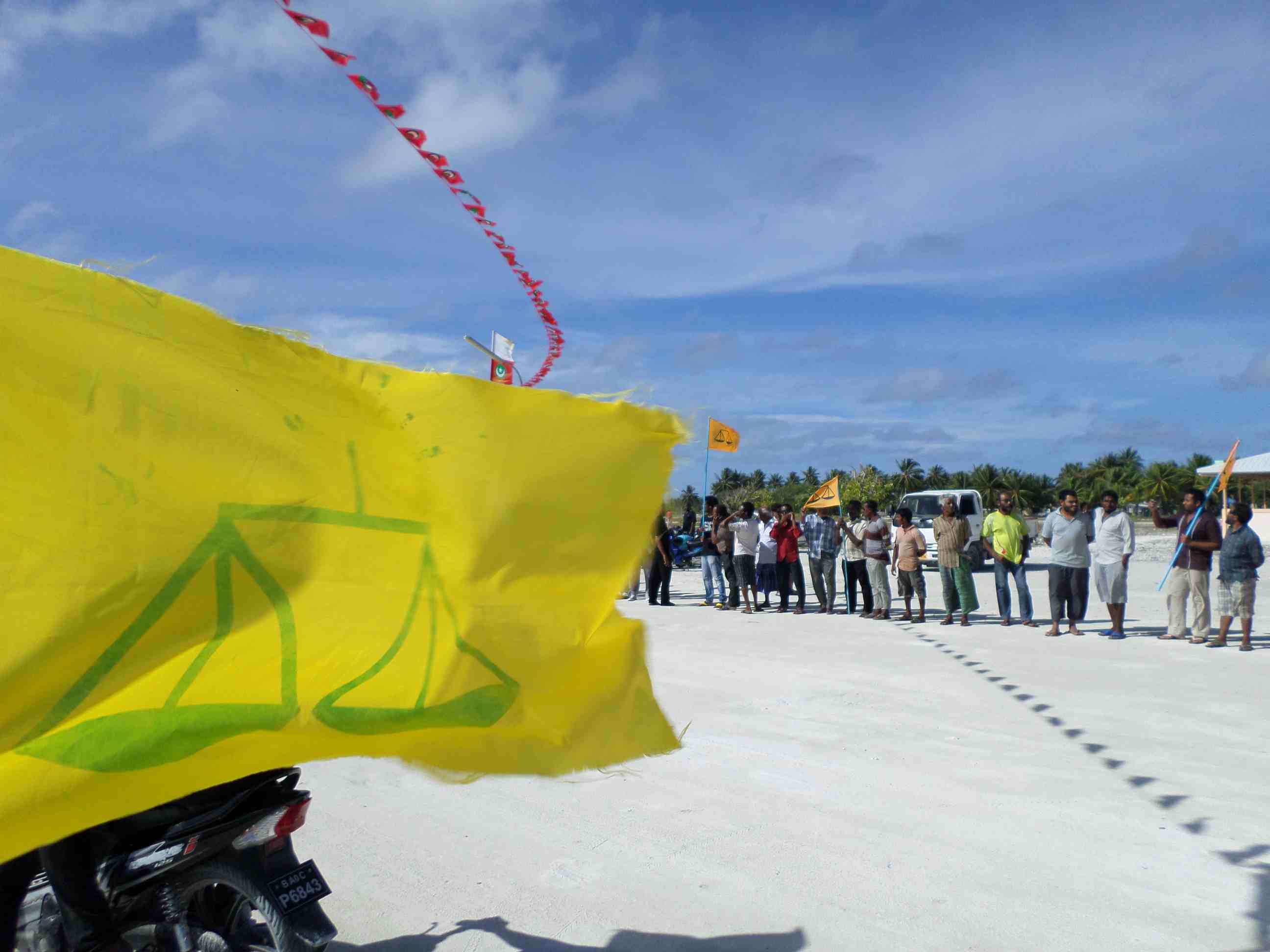Inside Nasheed’s campaign
Kulhudhuffushi
We arrive in Kulhudhuffushi at about 3:30 in the afternoon by speedboat from Hanimaadhoo. People line the harbour area to welcome Nasheed. Here there are more men than there were in Hanimaadhoo, but the women still out number them by far. Nasheed will launch the Agri-Business policy at the school hall in Kulhudhuffushi in about half an hour. Close to two hundred people attend.
The MDP’s Agri-Viyafari policy is ambitious. The plan is for the government to lease plots of land on various inhabited islands in each atoll, along with equipment, seeds, fertilisers and labourers to anyone interested in setting up a farm. The government will operate a mobile shop, a vessel called Fresh-Isles, which will be perpetually travelling to the islands and buying their produce.
“This way, all farmers will always be guaranteed a market,” Nasheed pledges.
Transporting local products to Male’ and other relatively large markets from their own islands is one of the biggest problems Maldivian farmers encounter today, Nasheed says.
This is a week in which such statements hit home. Newspapers are full of reports lamenting hundreds of thousands of lovely ripe mangoes from Fuammulaku that went rotten for lack of transport in the unusually rough weather. MDP’s AgriBusiness policy means a reduction in such losses.
“Farming should put Rufiya in the pocket, not just food on the table. It’s not about having enough muran’ga leaves to put in your omelette in the morning.” Over the course of the trip Nasheed warms to the muran’ga analogy and repeats it on different islands.
Currently the Maldives imports Rf245 million worth of agricultural products a year. AgriBusiness aims to slash the amount down to Rf108 million, Nasheed tells Kulhudhuffushi. “If we are going to reduce the amount of products we import, then we must increase the duty for those products” ensuring an attractive price for local products.
With plots of land, seeds, equipment and labour readily available for farmers to hire from the government, Nasheed says the AgriBusiness policy would increase national productivity by 1.7 percent. MDP will ensure the creation of at least a thousand agricultural experts in the country and will create 2500 new jobs for implementation of the policy alone.
Nasheed tells the people of Kulhudhuffushi that his government would have the farms and markets up and running within two and a half years. What MDP wants, Nasheed says, is the empowerment of people through their own industry, in public-private partnerships that opens up the country to the globalised market place, and puts money in all local pockets.
As Nasheed’s campaign has progressed, the gist of his speeches at policy launches has been this: Maldivians deserve better than their current hand-to-mouth existence. If people only stop to think about it, the Maldives has rich resources that can make the entire society wealthy rather than a handful of individuals filthy rich. People must reject habits of patronage ingrained in the ‘Maumoonism’ of the last 30-years and vote for an MDP government to, instead, work for a better life for themselves.
Agri-Business offers attractive prospects, and Nasheed is on top form in Kulhudhuffushi, bristling with energy and enthusiasm. Yet, the reaction among the crowd is somewhat muted. Nobody asks any questions when he opens up the floor. There’s applause at some points during the speech, but there is very little spontaneity among the audience.
“Kulhudhuffushi is always a difficult island. People are peculiar,” a campaign team member observes later, when I ask about the muted reaction. What ‘peculiar’ means is not defined by any of the several people who gives me the same response about the people of Kulhudhuffushi—‘eiee varah faadegge baeh’ [they are a very peculiar people].
A more likely explanation is the turbulent politics in the island’s recent history. On 8 February, when the police cracked-down brutally on MDP supporters in Male’, Kulhudhuffushi is one of several islands where people reacted with violence. There was an arson attack on the police station, and a further two incidents of unrest since. When Nasheed visited the island on 27 February 2012, tensions between MDP and PPM supporters broke out into direct confrontations.
At the moment, twenty-eight MDP members (including two councillors) from the island currently stand accused of various charges ranging from terrorism to obstruction of justice. Eleven hearings were held on 19 May, the day after Nasheed visited Kulhudhuffushi.
